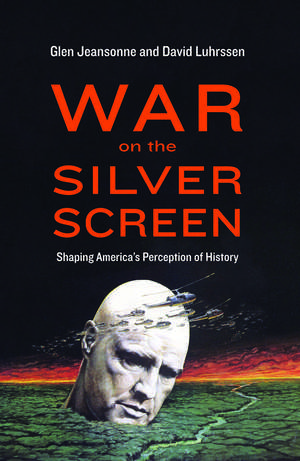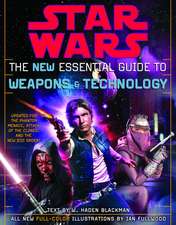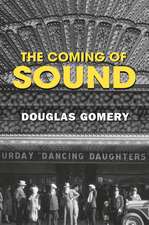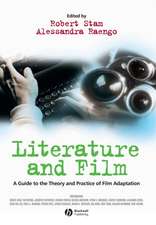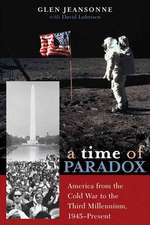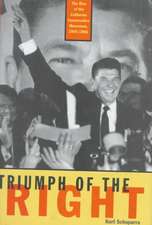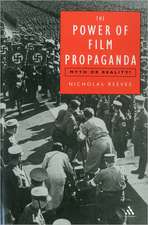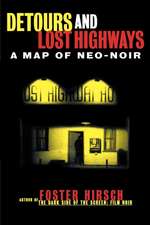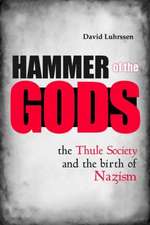War on the Silver Screen: Shaping America's Perception of History
Autor Glen Jeansonne, David Luhrssenen Limba Engleză Paperback – 30 sep 2014
In War on the Silver Screen Glen Jeansonne and David Luhrssen vividly demonstrate how war movies have burned the images and impressions of those wars onto the American psyche more concretely than has the reality of the wars themselves. That is, our feelings about wars are generated less by what we learn through study and discourse than by powerful cinematic images and dialogue. Films are compressed, intense, and immediate and often a collective experience rather than a solitary one. Actors and drama provide the visceral impact necessary to form perceptions of history that are much more enduring than those generated by other media or experiences.
War on the Silver Screen draws on more than a century of films and history, including classics such as All Quiet on the Western Front, Apocalypse Now, and The Hurt Locker, to examine the legacy of American cinema on twentieth- and twenty-first-century attitudes about war.
Preț: 106.83 lei
Nou
Puncte Express: 160
Preț estimativ în valută:
20.44€ • 21.34$ • 16.88£
20.44€ • 21.34$ • 16.88£
Carte disponibilă
Livrare economică 25 martie-08 aprilie
Preluare comenzi: 021 569.72.76
Specificații
ISBN-13: 9781612346410
ISBN-10: 1612346413
Pagini: 200
Dimensiuni: 140 x 216 x 15 mm
Greutate: 0.27 kg
Editura: Potomac Books Inc
Colecția Potomac Books
Locul publicării:United States
ISBN-10: 1612346413
Pagini: 200
Dimensiuni: 140 x 216 x 15 mm
Greutate: 0.27 kg
Editura: Potomac Books Inc
Colecția Potomac Books
Locul publicării:United States
Notă biografică
GLEN JEANSONNE is a professor of history at the University of Wisconsin–Milwaukee. He is the author of The Life of Herbert Hoover: Fighting Quaker, 1928–1933. DAVID LUHRSSEN is the arts and entertainment editor at Milwaukee’s Shepherd Express and has worked as a film critic for more than twenty years. He is the author of Mamoulian: Life on Stage and Screen.
Cuprins
Acknowledgments
Introduction
1. World War I (1914–1918)
All Quiet on the Western Front (1930)
Paths of Glory (1957)
Lawrence of Arabia (1962)
Gallipoli (1981)
2. World War II (1939–1945)
Casablanca (1942)
Saboteur (1942) and The Best Years of Our Lives (1946)
Twelve O’Clock High (1949)
Patton (1970)
Schindler’s List (1993)
Flags of Our Fathers (2006) and Letters from Iwo Jima (2006)
3. The Cold War (1947–1991), including the Korean War (1950–1953) and the Vietnam War (1955–1975)
The Manchurian Candidate (1962)
From Russia with Love (1963)
Dr. Strangelove, Or: How I Learned to Stop Worrying and Love the Bomb (1964) and Fail-Safe (1964)
Apocalypse Now (1979)
Charlie Wilson’s War (2007)
4. The War on Terror (2001–)
United 93 (2006)
The Hurt Locker (2008) and Zero Dark Thirty (2012)
Notes
Bibliography
Recenzii
“Jeansonne and Luhrssen have cleverly used movies about American wars to point out that what we often know—or remember—about those difficult events is what we saw in the movies. So, what the movies tell us about wars is far more important than the entertainment they provide. Does that mean our collective memories of the most dangerous and important events in American history are accurate? This well-conceived book provides a fascinating answer. If you can only read one book this season about the movies, this is it.”—James W. Cortada, senior research fellow at the Charles Babbage Institute, University of Minnesota
